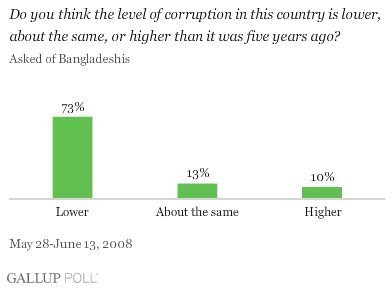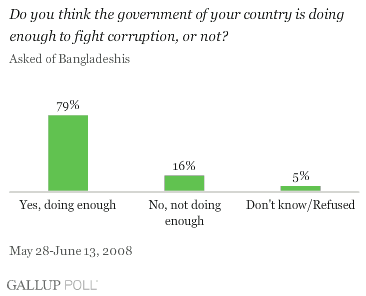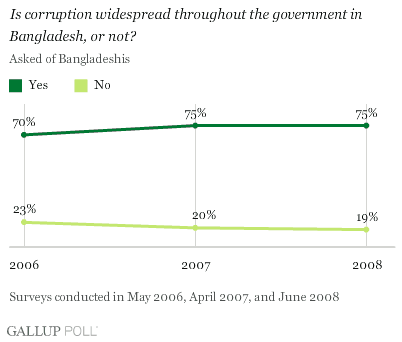WASHINGTON, D.C. -- When the Awami League in December 2008 won Bangladesh's parliamentary elections in a landslide, it inherited the previous government's pledge to rid the country of corruption. During the military-backed, caretaker government's two-year tenure, Gallup asked Bangladeshis about their views on corruption, finding a majority saying that the level of corruption in the country is lower (73%) than it was five years ago.

Bangladesh's caretaker government focused on battling corruption in the country by jailing many public and business officials on charges of corruption. What's more, the government rejuvenated the Anti-Corruption Commission (ACC), which ensures investigates and helps convict political individuals for misusing their political power. At the time of the Gallup Poll, the reaction of the Bangladeshi people appears to be extremely favorable, as 79% say the government is doing enough to fight corruption.

With the Awami League now in power and the new Prime Minister, Sheikh Hasina, sworn in, it is important that Bangladesh's new leaders work to build on the progress made rather than reverse the momentum.
The Bangladesh Election Commission this week reported having received more than 100 complaints regarding December's parliamentary elections, including allegations of voter intimidation, ballot box stuffing, and violence against polling agents. In such a climate, there is little doubt the question of corruption is going away.
While a majority of Bangladeshis believe progress has been made with regard to corruption in their country, 75% still perceive it to be a widespread problem in their government, a number that has remained unchanged since 2007 and has increased slightly since 2006.

The results of the Gallup Polls support the view that even in the face of positive change, the level of corruption in Bangladesh will still be a major point of discussion and remain an area in which Bangladeshis have a high level of doubt and uncertainty.
Bottom Line
In assessing relative successes in Bangladesh, it is clearly understood that no winning parties are free from the sins of corruption.
One area in which the Awami League can show great efforts and commitments to fighting corruption is to ensure that individuals convicted of corruption play no active future role in the government. Also, the new government should make certain that the ACC plays a significant role in the governance of the future political activities of Bangladesh.
Survey Methods
Results are based on face-to-face interviews with 1,000 adults in Bangladesh, aged 15 and older, conducted May 28-June 13, 2008. For results based on the total sample of national adults, one can say with 95% confidence that the maximum margin of sampling error is ±3.5 percentage points. In addition to sampling error, question wording and practical difficulties in conducting surveys can introduce error or bias into the findings of public opinion polls.
